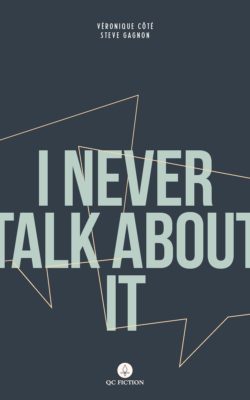In the beginning, secrets were solicited through Web ads and in public places around Québec City. These became a series of monologues performed in a park called Chaque automne j’ai envie de mourir. This project turned into a book of short stories of the same name by Véronique Côté and Steve Gagnon. The latest iteration, I Never Talk About It, is an experiment in translation that sets out to explore the marks translators leave on a text. The thirty-seven short stories from Côté and Gagnon’s collection are rendered into English by thirty-seven translators, a motley group that includes award-winning and first-time translators, a few people who usually write in French, and even a few who can barely speak it. Their identities and approaches are only revealed at the end of each piece, introduced by an adverb whimsically summing up how they translated – “gingerly,” “ambidextrously,” and so forth.

I Never Talk About It
Véronique Côté and Steve Gagnon
QC Fiction
$19.95
paper
220pp
9781771861090
There is humour throughout, sometimes broad, as in “Snot,” where the narrator confesses a penchant for snot-eating, or wry and buried in the details, such as in “Ice,” whose narrator, valiantly fighting her depression, makes coffee every morning not to drink, just to smell. “Tsunami” brilliantly captures the feeling of falling in love where the dizzying power, the essential naïveté, is spiced with a modern acknowledgement of love’s ephemeral nature: “The point is that me and Simon Lepage made out and it was the beginning of time. Everything exploded, the water in his eyes, the room, the apartment, the city, all of Quebec … a huge wave burst out from inside our bodies and rushed out into the world and washed away everything … for the second time in my life, I’m in love. I love Simon Lepage and that’s an understatement.”
I Never Talk About It allows for more variety than the original French collection. The narrator’s gender is sometimes unclear, adding a dimension of ambiguity, whereas in French, a gendered adjective gives it away. There are different approaches to punctuation: some translators embrace the original stream-of- consciousness style, others rein in the run-on sentences to sound more English, and still others opt for compromise. Similarly, some stories retain all references to Quebec while others are recast in America or Britain. A few suffer from literal translations that reveal an unfamiliarity with Québécois idioms. On the other hand, one story, “Wrestling,” challenges accepted wisdom about what constitutes a good translation: this story sounds French; you can almost hear an accent. The words on the page are English, but it is as if the French hasn’t been washed out. This voice stayed with me. Surely that must be one criterion of a good translation. mRb






0 Comments